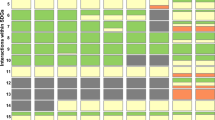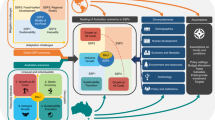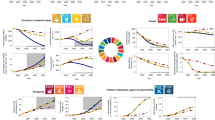Abstract
The 2030 Agenda for Sustainable Development—including 17 interconnected Sustainable Development Goals (SDGs) and 169 targets—is a global plan of action for people, planet and prosperity. SDG7 calls for action to ensure access to affordable, reliable, sustainable and modern energy for all. Here we characterize synergies and trade-offs between efforts to achieve SDG7 and delivery of the 2030 Agenda as a whole. We identify 113 targets requiring actions to change energy systems, and published evidence of relationships between 143 targets (143 synergies, 65 trade-offs) and efforts to achieve SDG7. Synergies and trade-offs exist in three key domains, where decisions about SDG7 affect humanity’s ability to: realize aspirations of greater welfare and well-being; build physical and social infrastructures for sustainable development; and achieve sustainable management of the natural environment. There is an urgent need to better organize, connect and extend this evidence, to help all actors work together to achieve sustainable development.
This is a preview of subscription content, access via your institution
Access options
Access Nature and 54 other Nature Portfolio journals
Get Nature+, our best-value online-access subscription
$29.99 / 30 days
cancel any time
Subscribe to this journal
Receive 12 digital issues and online access to articles
$119.00 per year
only $9.92 per issue
Buy this article
- Purchase on Springer Link
- Instant access to full article PDF
Prices may be subject to local taxes which are calculated during checkout


Similar content being viewed by others
References
Transforming our World: the 2030 Agenda for Sustainable Development A/RES/70/1 (UN General Assembly, 2015).
Brew-Hammond, A. in Energy for Development 35–43 (Springer Netherlands, 2012).
Lu, Y., Nakicenovic, N., Visbeck, M. & Stevance, A.-S. Policy: five priorities for the UN Sustainable Development Goals. Nature 520, 432–433 (2015).
Nilsson, M., Griggs, D. & Visback, M. Map the interactions between Sustainable Development Goals. Nature 534, 320–322 (2016).
REthinking Energy 2017: Accelerating the Global Energy Transformation (International Renewable Energy Agency, 2017); http://go.nature.com/2yDr6Ge
A Guide to SDG Interactions: from Science to Implementation (International Council for Science, 2017); http://go.nature.com/2gpeaJz
Hall, M. A. & Wright, R. F. Systematic content analysis of judicial opinions. California Law Rev. 96, 63–122 (2008).
Butler, A. J., Thomas, M. K. & Pintar, K. D. M. Systematic review of expert elicitation methods as a tool for source attribution of enteric illness. Foodborne Pathog. Dis. 12, 367–382 (2015).
Morgan, M. G. Use (and abuse) of expert elicitation in support of decision making for public policy. Proc. Natl Acad. Sci. USA 111, 7176–7184 (2014).
Waage, J. et al. Governing the UN sustainable development goals: interactions, infrastructures, and institutions. Lancet Glob. Health 3, e251–e252 (2015).
Lights Power Action: Electrifying Africa (Africa Progress Panel, 2017); http://go.nature.com/2yCj1Q2
Poor People’s Energy Outlook 2014 (Practical Action, 2014); http://go.nature.com/2yuI4a9
Dornan, M. Access to electricity in Small Island Developing States of the Pacific: Issues and challenges. Renew. Sustain. Energy Rev. 31, 726–735 (2014).
Electricity and Education: The Benefits, Barriers, and Recommendations for Achieving the Electrification of Primary and Secondary Schools (UNDESA, 2014); http://go.nature.com/2hRSR3R
Sovacool, B. K. & Ryan, S. E. The geography of energy and education: Leaders, laggards, and lessons for achieving primary and secondary school electrification. Renew. Sust. Energy Rev. 58, 107–123 (2016).
Chaurey, A. & Kandpal, T. C. Assessment and evaluation of PV based decentralized rural electrification: An overview. Renew. Sust. Energ. Rev. 14, 2266–2278 (2010).
Jenkins, K., McCauley, D., Heffron, R., Stephan, H. & Rehner, R. Energy justice: A conceptual review. Energy Res. Soc. Sci. 11, 174–182 (2016).
Sovacool, B. K., Heffron, R. J., McCauley, D. & Goldthau, A. Energy decisions reframed as justice and ethical concerns. Nat. Energy 1, 16024 (2016).
Sovacool, B. K. & Dworkin, M. H. Global Energy Justice: Problems, Principles, and Practices (Cambridge Univ. Press, 2014)
Tilt, B., Braun, Y. & He, D. Social impacts of large dam projects: A comparison of international case studies and implications for best practice. J. Environ. Manage. 90, S249–S257 (2009).
Hunsberger, C., Bolwig, S., Corbera, E. & Creutzig, F. Livelihood impacts of biofuel crop production: Implications for governance. Geoforum 54, 248–260 (2014).
Tomei, J. The sustainability of sugarcane-ethanol systems in Guatemala: Land, labour and law. Biomass Bioenergy 82, 94–100 (2015).
Kirshner, J. & Power, M. Mining and extractive urbanism: Postdevelopment in a Mozambican boomtown. Geoforum 61, 67–78 (2015).
Parikh, P., Chaturvedi, S. & George, G. Empowering change: The effects of energy provision on individual aspirations in slum communities. Energy Policy 50, 477–485 (2012).
Mentis, D. et al. Lighting the world: The first global application of an open source, spatial electrification tool (ONSSET), with a focus on sub-Saharan Africa. Environ. Res. Lett. 12, 085003 (2017).
World Energy Outlook 2016 (IEA, 2016).
Clean Household Energy for Health, Sustainable Development, and Wellbeing of Women and Children (World Health Organisation, 2016); http://go.nature.com/2xUbUp5
Fuso Nerini, F. et al. A cost comparison of technology approaches for improving access to electricity services. Energy 95, 255–265 (2016).
Ringler, C. et al. Global linkages among energy, food and water: an economic assessment. J. Environ. Stud. Sci. 6, 161–171 (2016).
Modern Energy Services for Health Facilities in Resource-Constrained Settings (World Health Organisation, World Bank, 2015).
Howells, M. et al. Integrated analysis of climate change, land-use, energy and water strategies. Nat. Clim. Change 3, 621–626 (2013).
Broto, V. C. Energy landscapes and urban trajectories towards sustainability. Energy Policy 108, 755–764 (2017).
Perspectives for the Energy Transition: Investment Needs for a Low-Carbon Energy System (IEA, IRENA, 2017); http://go.nature.com/2zoUU6B
van Vliet, M. T. H., Wiberg, D., Leduc, S. & Riahi, K. Power-generation system vulnerability and adaptation to changes in climate and water resources. Nat. Clim. Change 6, 375–380 (2016).
Díaz, S. et al. The IPBES Conceptual Framework—connecting nature and people. Curr. Opin. Environ. Sustain 14, 1–16 (2015).
Global Environment Outlook 5—Environment for the Future We Want (UNEP, 2012); http://doi.org/c6bn5p
World Energy Assessment: Energy and the challenge of Sustainability (United Nations Development Programme, 2000); http://go.nature.com/2yDPW8V
IPCC Climate Change 2014: Synthesis Report (eds Core Writing Team, Pachauri, R. K. & Meyer, L. A.) (2014).
Resource Efficiency: Potential and Economic Implications (UNEP, 2017); http://go.nature.com/2yF3cKD
Energy and Air Pollution: World Energy Outlook—Special Report (International Energy Agency, 2016); http://go.nature.com/2lLqBoQ
Conway, D. et al. Climate and southern Africa’s water-energy-food nexus. Nat. Clim. Change 5, 837–846 (2015).
UN World Water Development Report 2014: Water and Energy (UN Water, 2014); http://go.nature.com/2A3d8ej
Energy-Smart Food for People and Climate (FAO, 2011); http://go.nature.com/2ioXzKq
Fuso Nerini, F., Andreoni, A., Bauner, D. & Howells, M. Powering production; the case of the sisal fibre production in the Tanga region, Tanzania. Energy Policy 98, 544–556 (2016).
Global Tracking Framework 2017: Progress Towards Sustainable Energy (World Bank, 2017); http://go.nature.com/2A2nQBA
Fuso Nerini, F., Ray, C. & Boulkaid, Y. The cost of cooking a meal; the case of Nyeri County, Kenya. Environ. Res. Lett. 12, 065007 (2017).
Wernberg, T. et al. An extreme climatic event alters marine ecosystem structure in a global biodiversity hotspot. Nat. Clim. Change 3, 78–82 (2013).
Hoegh-Guldberg, O. et al. Coral reefs under rapid climate change and ocean acidification. Science 318, 1737–1742 (2007).
Sikkema, R. et al. Legal harvesting, sustainable sourcing and cascaded use of wood for bioenergy: Their coverage through existing certification frameworks for sustainable forest management. Forests 5, 2163–2211 (2014).
Daw, T., Brown, K., Rosendo, S. & Pomeroy, R. Applying the ecosystem services concept to poverty alleviation: the need to disaggregate human well-being. Environ. Conserv. 38, 370–379 (2011).
Terama, E., Milligan, B., Jiménez-Aybar, R., Mace, G. M. & Ekins, P. Accounting for the environment as an economic asset: global progress and realizing the 2030 Agenda for Sustainable Development. Sustain. Sci. 11, 945–950 (2016).
Knowledge-Action Net works (Future Earth, accessed 2 November 2017); http://go.nature.com/2AhvJUM
Progress Toward Sustainable Energy 2015 (IEA, World Bank, 2015); http://go.nature.com/2xXxchB
Acknowledgements
The authors would like to thank X. Lemaire, M. Shipworth, O. Adeoye and C. Huggins for their helpful comments. Also thanks to the Energy and Development group at UCL, which provided a platform for this work to be realized.
Author information
Authors and Affiliations
Contributions
F.F.N. coordinated inputs from other authors, designed and contributed to the expert elicitation process, and wrote the paper. J.T., B.M., L.S.T. and Y.M. designed and contributed to the expert elicitation process, and wrote the paper. I.B., P.P., M.B., A.B., C.S., V.C.B. and G.A. contributed to the peer-reviewed expert elicitation process, and writing sections of the paper.
Corresponding authors
Ethics declarations
Competing interests
The authors declare no competing financial interests.
Additional information
Publisher’s note: Springer Nature remains neutral with regard to jurisdictional claims in published maps and institutional affiliations.
Electronic supplementary material
Supplementary Table 1
Full results for answering questions (A) and (B), as summarized in Fig. 2
Rights and permissions
About this article
Cite this article
Fuso Nerini, F., Tomei, J., To, L.S. et al. Mapping synergies and trade-offs between energy and the Sustainable Development Goals. Nat Energy 3, 10–15 (2018). https://doi.org/10.1038/s41560-017-0036-5
Received:
Accepted:
Published:
Issue Date:
DOI: https://doi.org/10.1038/s41560-017-0036-5
This article is cited by
-
The potential and challenges of off-grid solar photovoltaics in resource-challenged settings: the case of sub-Saharan Africa
Nature Reviews Materials (2024)
-
Climate threats to coastal infrastructure and sustainable development outcomes
Nature Climate Change (2024)
-
Global transboundary synergies and trade-offs among Sustainable Development Goals from an integrated sustainability perspective
Nature Communications (2024)
-
Implementing the water-energy-food nexus approach to create synergies and reduce tradeoffs between the Sustainable Development Goals
SN Social Sciences (2024)
-
Dynamic disparities in clean energy use across rural–urban, regional, and ethnic boundaries in China
Ambio (2024)



